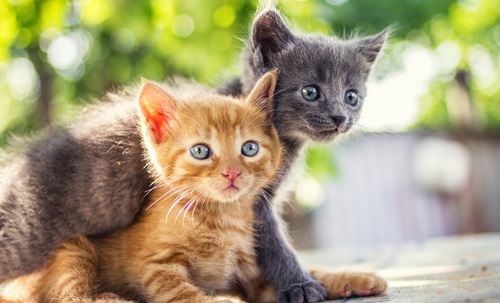Lately, your fuzzy feline is showing some extra-frisky behavior – and you’re not sure exactly why. You’ve given him plenty of scritches behind the ears, snuggles, treats, and lots of attention – so why is your kitty acting so hyper?
Pet owners are always concerned with their pet’s behavior and may ask many questions like why is my dog being lazy or why is my cat sneezing. But not to worry, questions for new owners can always be answered. For new pet owners – particularly first-time kitten parents – trying to understand a little kitten’s crazy behavior can be a bit befuddling, but not to worry. In fact, most experts will agree that hyperactivity in kittens is not only considered normal behavior, but hardwired in their DNA.
Learning how to entertain a cat can be beneficial during hyper times. However, similar to small children, young cats are prone to bursts of energy; and it’s important for their humans to provide them with adequate playtime, discipline, and of course, lots of patience. Let’s explore some of the reasons why kittens get so hyper, as well as tips for how to calm them down.
Understanding Hyperactive Kittens: Normal or Crazy Behavior?
Once an adopted kitten settles into his new home, it’s perfectly natural to explore his new environment. At first, he might be shy or stand-offish, especially if he was living in an animal shelter. But after a few days, kittens will typically acclimate to their surroundings (and humans), which may include some bouts of hyperactivity.
Research has shown that high-energy behavior in young cats is standard fare – as a matter of fact, it’s actually a sign that the kitten is learning life skills. Much like their wild ancestors, domestic cats are instinctually driven to learn certain survival skills – such as climbing, running, and even attacking – at a very early age. And while it may seem crazy (especially for folks who have never raised a kitten before), it’s completely normal for them to show signs of aggression.
To further understand a kitten’s hyperactive behavior, here are several reasons why he may be showing signs of boundless energy (and, in some instances, how to help guide him along the way):
Feline Instinct: Because cats are natural predators, even domestic kittens are instinctively set up to act out ‘hunting’ behaviors similar to their cousins in the wild – stalking, pouncing, and maybe even attacking a rogue toe sticking out of a blanket – are all just part of the process. However, kitties don’t automatically know what they’re doing, so they must develop those ingrained skill sets in their own environment. Even if a parent decides that the cat will live strictly indoors, it’s still important to the kitten’s overall development to hone these instinctive (although seemingly hyperactive) urges.
Helpful Tips: Some experts suggest engaging the kitty with feline-friendly toys that look like prey – e.g., fuzzy mice plushies, a plastic fish on a pole, etc. – to help develop his hunting and predatory skills. Other beneficial interactive toys, such as puzzles and tunnels, can help young cats in their cognitive development and keep their minds sharp.

Social Skill Development: Domestic cats require lots of patience, time and guidance from their humans in order to develop acceptable social skills. Although a kitten’s mom and its littermates are the first to help in this natural process, a young cat will require additional discipline from his pet parents. In the instance he was taken away from his mother too soon, he may need some extra TLC while learning the ropes. Teaching a kitten appropriate social skills at an early age is essential, since they are most impressionable within the first eight weeks. Acclimating him to different scenarios will expose him to stimuli – such as people, places and things – that can potentially enrich his social development. For example, socializing kittens when they’re very young will help them to learn not to scratch or bite other animals or people, or in other cases, help avoid hyperactivity or aggression around strangers/in new situations, etc.
Helpful Tips: Developing a kitten’s social skills can be taught during one-on-one playtime, which also becomes a valuable bonding moment for both cats and their humans. For pet parents who are having difficulties with overly aggressive behavior, consult with a trusted vet for professional training tips. There are also many videos available on how to socialize kittens that may be useful to first-time kitten owners.
Anxiety & Fear: While the phrase ‘scaredy-cat’ may have been a phrase used on the playground, it’s actually a very real thing when it comes to young kittens. In fact, it’s all part of the kitty’s learning curve: he may have experienced something new and in turn, won’t stop running around the house like a maniac. Experts suggest mindful awareness – in other words, try to correlate these seemingly out-of-the-blue episodes. If it’s the kitten’s first time seeing a baby, hearing a strange noise in the apartment, or meeting the neighbor’s giant Labrador, he may have been spooked – and in turn, his fearsome or anxious behavior has manifested itself in a case of the zoomies. Wide-eyed and hair standing on end, he may run around, scratch anxiously at the carpet, or hide under the bed until he feels safe.





